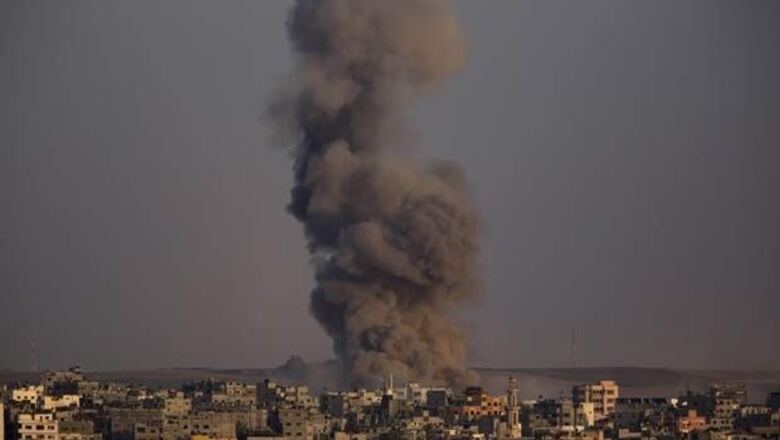
views
Gaza/Cairo: Palestinians on Wednesday were still coming to terms with the scale of devastation in Gaza on the second day of a ceasefire between Israel and Hamas, even as the two sides engaged in Egypt-mediated diplomacy to put an end to a war that has claimed about 2,000 lives.
Egyptian officials mediating talks for the durable truce met a Palestinian delegation on Wednesday to relay terms laid down by an Israeli team.
For the second time in a week, Egypt's intelligence chief Mohamed Farid El-Tohamy met with the Palestinian delegation in Cairo. Tohamy spoke with Azzam Al-Ahmed, a leading figure of Fatah and head of the delegation, about the endeavors of Cairo to achieve the Palestinian demands, Egypt's state-owned news agency MENA reported.
The Palestinian delegation on Monday had officially presented its demands for a permanent ceasefire including an immediate Israeli withdrawal from Gaza, halting airstrikes, lifting the Israeli blockade on the coastal strip and releasing Palestinian prisoners.
The Palestinian delegation is composed of negotiators from all major factions, including Hamas.
"The most important thing to us is removing the blockade and start reconstructing Gaza. There can be no deal without that," Bassam Salhi, a Palestinian delegate, said.
The Israeli delegation, which arrived in Cairo on Tuesday is comprised of three negotiators, Isaac Molha, adviser to Prime Minister Benjamin Netanyahu, Yoram Cohen, chief of Shin Bet security agency and Amos Gilad, head of the political bureau at the defence ministry.
A Palestinian official close to the talks told newspapers today that Egypt has offered to extend the current ceasefire to 120 hours, and that the issue of the disarmament of Gaza is not on the table.
"The negotiations are hard. The Zionist enemy wants to claim achievements and doesn't want to admit its defeat," Maher al-Taher, member of the Popular Front for the Liberation of Palestine (PFLP), was quoted as saying.
The 72-hour ceasefire, which came into effect from Tuesday, has brought relief to millions on both sides after one month of fighting killed nearly 1,900 Palestinians and 67 people in Israel, mostly soldiers.
Tens of thousands of Gaza residents who were displaced due to heavy shelling from Israel, began returning back from the UN shelters, only to find their homes and businesses in ruins.
Shops, banks and markets reopened across Gaza as people started repairing damaged property with emergency services clearing rubble to search for bodies in the worst hit areas. For most Palestinians, rebuilding their shattered lives is still a distant goal. Their immediate challenge is to secure basic necessities, like water, food and shelter
Running water is scarce and there are only about two-to-four hours of electricity a day, according to the UN. The United Nations Relief and Works Agency (UNRWA) has been sheltering around 270,000 people in its school buildings in Gaza.
Meanwhile, Al-Taher also ruled out Israeli demands of demilitarisation of Gaza as "a dream". A prominent Hamas leader Izzat al-Rashq said the Palestinian delegation was waiting "to receive an official response from Israel on the demands we presented to the Egyptians".
A Palestinian official was quoted in Al-Hayat as saying that Egypt has promised the Palestinian delegation to open the Rafah border crossing after the signing of the ceasefire agreement with Israel on the condition that the Palestinian Authority (PA) is put in charge of the crossing.
Hamas leader Ismail Haniyeh has stressed that "what the enemy could not achieve on the physical battlefield it will not achieve in the diplomatic battlefield."
"I am confident that our Egyptian and Arab brothers all want to help lift the blockage permanently. We support the unified Palestinian delegation in order to produce the most appropriate diplomatic solution and to bring about a resolution that would reflect both the immeasurable sacrifices of our people and the work of the resistance. The delegation stuck to our demands," Haniyeh said.
Some Gazans, however, feel that Egypt has been a part of their problem.
"The economy in Gaza was quite stable and we were getting everything till the tunnel network operated properly. Ever since the new regime took over in Egypt, it has tried to shut down the tunnels and suffocate us," a resident of Gaza city said.
The ceasefire, announced by Egypt late on Monday, is the longest lull since fighting began on July 8. The Israeli army has said it has destroyed 32 cross-border tunnels, struck nearly 4,800 targets and killed 900 Palestinian "terrorists".
Some Human rights groups and the UN however have said that the vast majority of those killed in Gaza were civilians.
The latest Gaza conflict is the third in less than six years. Previous ceasefires have brought calm for a matter of months or years, but failed to tackle the broader issues.
Around 520,000 Gaza residents were displaced during the current conflict, according to the United Nations. That's about 29 per cent of the territory's 1.8 million inhabitants.
The United Nations estimates that more than 10,000 homes have been destroyed or severely damaged in Gaza, an already crowded and impoverished territory.




















Comments
0 comment